If you're looking for herbal teas to help you sleep better, chamomile, lavender, and valerian root should be at the top of your list. Chamomile calms your mind and improves sleep quality, while lavender reduces anxiety and fosters relaxation. Valerian root serves as a natural alternative to sleep aids, promoting deeper slumber. You might also consider lemon balm for its soothing properties and passionflower for added tranquility. Try blending these herbs to create a personalized sleep remedy. Keep exploring, and you'll discover even more herbal combinations to enhance your sleep routine.
Chamomile Tea Recipes
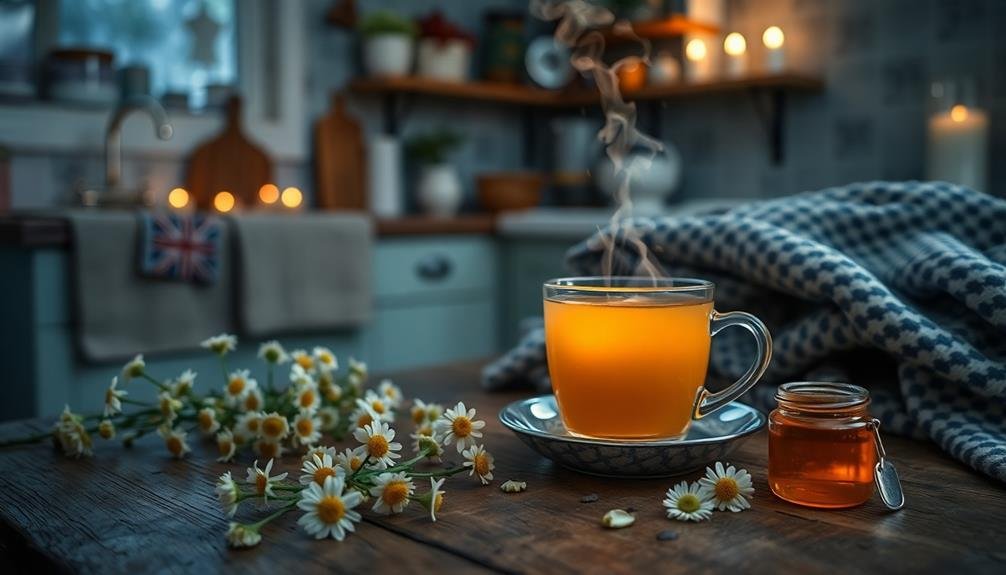
While you might think of chamomile tea as just a bedtime beverage, it can be a delightful and versatile drink that you can easily customize. One simple way to enhance your chamomile tea is by adding a slice of lemon. The citrusy flavor brightens the tea and adds a revitalizing twist, giving you a perfect balance of soothing chamomile and zesty lemon.
If you're in the mood for something sweeter, try stirring in a teaspoon of honey or agave syrup. This natural sweetener complements the floral notes of chamomile and can help create a cozy, comforting cup.
For a spiced version, add a pinch of cinnamon or a few cloves before steeping. The warmth of the spices can elevate your tea and make it even more inviting.
You could also mix chamomile with other herbal teas, like peppermint or lemon balm, for a unique flavor profile that promotes relaxation. Experiment with different combinations to find your perfect blend.
No matter how you choose to prepare it, chamomile tea can be a delightful ritual that not only prepares you for sleep but also provides a moment of tranquility in your day. Enjoy!
Lavender Tea Blends
If you're looking for a soothing way to unwind, lavender tea blends might be just what you need.
Known for their calming effects, these blends can help you relax and improve your sleep quality.
Let's explore the benefits of lavender tea and some of the best blends you can try.
Benefits of Lavender Tea
Lavender tea blends offer a soothing experience that can greatly enhance your sleep quality. The calming aroma and flavor of lavender are well-known for promoting relaxation and reducing anxiety. When you sip on a warm cup before bedtime, you're not just enjoying a delightful drink; you're also reaping numerous benefits.
Here are some advantages of incorporating lavender tea into your nightly routine:
- Reduces Anxiety: Lavender is recognized for its anxiolytic properties, helping to alleviate stress and tension.
- Improves Sleep Quality: The sedative effects of lavender can help you fall asleep faster and enjoy deeper sleep cycles.
- Supports Digestive Health: Lavender tea may relieve digestive issues, which can be particularly helpful if anxiety disrupts your stomach.
- Enhances Mood: The pleasant scent of lavender can uplift your mood, making you feel more relaxed and content.
Best Lavender Tea Blends
When you're ready to unwind and drift off to sleep, exploring the best lavender tea blends can take your relaxation to the next level. Lavender's calming properties pair beautifully with other soothing ingredients, making these blends perfect for your nighttime routine.
One delightful blend to try is chamomile and lavender tea. Chamomile enhances relaxation, while lavender adds a floral note, creating a deliciously calming cup.
Another great option is lemon balm and lavender. Lemon balm is known for its mild sedative effects, and together with lavender, it promotes a peaceful night's sleep.
If you enjoy a hint of sweetness, look for lavender blends that include honeybush or rooibos. These naturally sweet herbs complement lavender and make for a comforting, caffeine-free beverage.
For something a bit more adventurous, consider a blend with peppermint. The coolness of peppermint balances lavender's floral notes and can help clear your mind.
Whichever blend you choose, brewing a cup of lavender tea before bed can help you create a soothing ritual, making it easier to relax and prepare for a restful night's sleep.
Enjoy experimenting with these blends to find your personal favorite!
Valerian Root Combinations
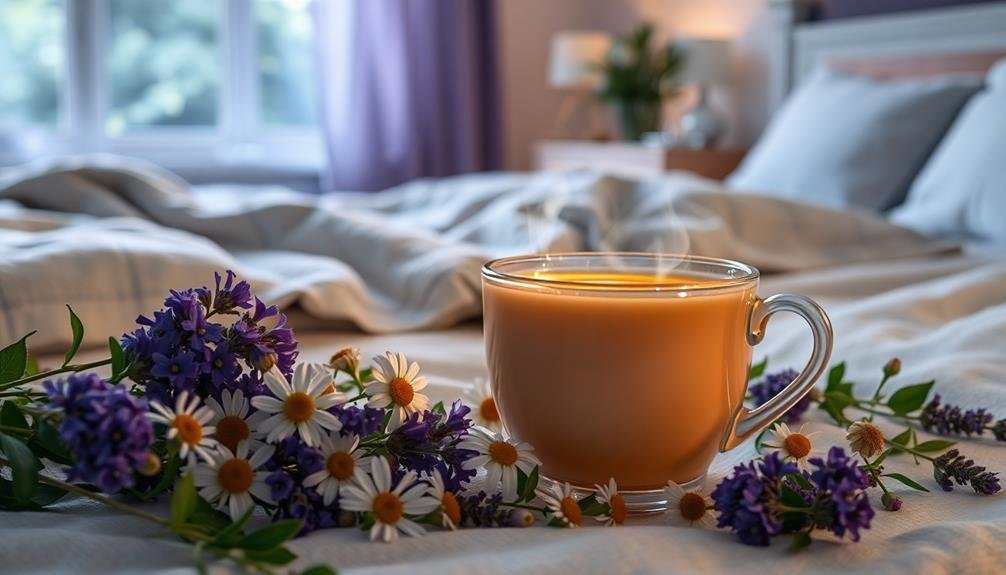
When it comes to improving your sleep, valerian root stands out for its calming effects.
You can enhance its benefits by mixing it with other effective herbal blends, ensuring you get the most out of your tea.
Let's explore the best combinations, along with preparation tips and dosage recommendations.
Valerian Root Benefits
Valerian root has long been celebrated for its calming properties, making it a popular choice among those seeking better sleep. This herbal remedy not only helps you fall asleep faster but can also improve the overall quality of your slumber.
If you're looking to enhance your nighttime routine, considering valerian root could be a wise decision.
Here are some key benefits of valerian root:
- Reduces Anxiety: It can calm your mind, making it easier to unwind at the end of the day.
- Improves Sleep Quality: Many users report deeper, more restful sleep after using valerian root.
- Fewer Nighttime Awakenings: It may help you stay asleep longer, reducing those annoying interruptions during the night.
- Natural Alternative: Valerian root offers a gentle, herbal option for those who prefer to avoid pharmaceutical sleep aids.
Incorporating valerian root into your evening ritual can be a powerful step towards achieving a more restful night.
Whether you choose it in tea form or as a supplement, you might just find the relief you've been craving.
Effective Herbal Blends
Combining valerian root with other calming herbs can enhance its sleep-promoting effects, creating a powerful herbal blend for your nighttime routine. You might find that certain combinations work better for you, helping to soothe your mind and prepare your body for restful sleep.
Here's a quick reference table for some effective valerian root blends:
| Herbal Ingredient | Benefits | Suggested Use |
|---|---|---|
| Chamomile | Reduces anxiety, promotes relaxation | Steep for 5-10 minutes |
| Lemon Balm | Eases stress and enhances mood | Blend with valerian in tea |
| Passionflower | Improves sleep quality | Use in equal parts with valerian |
| Hops | Calming effects, aids sleep | Combine with valerian for bedtime tea |
Experimenting with these blends can help you find your perfect nighttime tea. Each herb brings its unique properties, contributing to a more restful sleep experience. Try them out, and see which blends resonate with you for a peaceful night's rest.
Preparation and Dosage
To get the most out of valerian root combinations, proper preparation and dosage are vital. When you're ready to brew your herbal tea, start by measuring the right amount of valerian root. Typically, a dosage of 300 to 600 mg is recommended for effective sleep support.
You'll want to steep the valerian root in hot water for about 10 to 15 minutes. This allows the beneficial compounds to fully extract into the water.
Here are some tips to enhance your valerian root tea experience:
- Combine with calming herbs: Blend valerian root with chamomile or passionflower for added soothing effects.
- Use fresh, quality ingredients: Opt for organic valerian root to guarantee you're getting the best quality.
- Monitor your body's response: Start with a lower dosage and adjust as needed based on how you feel.
- Establish a bedtime routine: Consistency is key—try to drink your tea at the same time each night to signal to your body it's time to wind down.
Lemon Balm Infusions
Lemon balm infusions offer a soothing remedy that can enhance your sleep quality. This herb, known for its calming properties, helps reduce anxiety and promotes relaxation. By sipping on a warm cup of lemon balm tea before bed, you create a comforting ritual that signals your body it's time to unwind.
Here's a quick comparison of lemon balm's benefits alongside other popular herbal teas:
| Herbal Tea | Primary Benefit | Best Time to Consume |
|---|---|---|
| Lemon Balm | Calms anxiety, promotes relaxation | 30-60 minutes before bed |
| Chamomile | Improves sleep quality | 30-60 minutes before bed |
| Lavender | Reduces stress, enhances sleep | 30-60 minutes before bed |
To make a lemon balm infusion, steep fresh or dried leaves in hot water for about 10 minutes. The gentle lemony flavor not only tastes delightful but also helps ease tension, making it easier for you to drift off into a restful slumber. Incorporating lemon balm into your evening routine can be a simple yet effective way to improve your sleep experience.
Passionflower Tea Variations
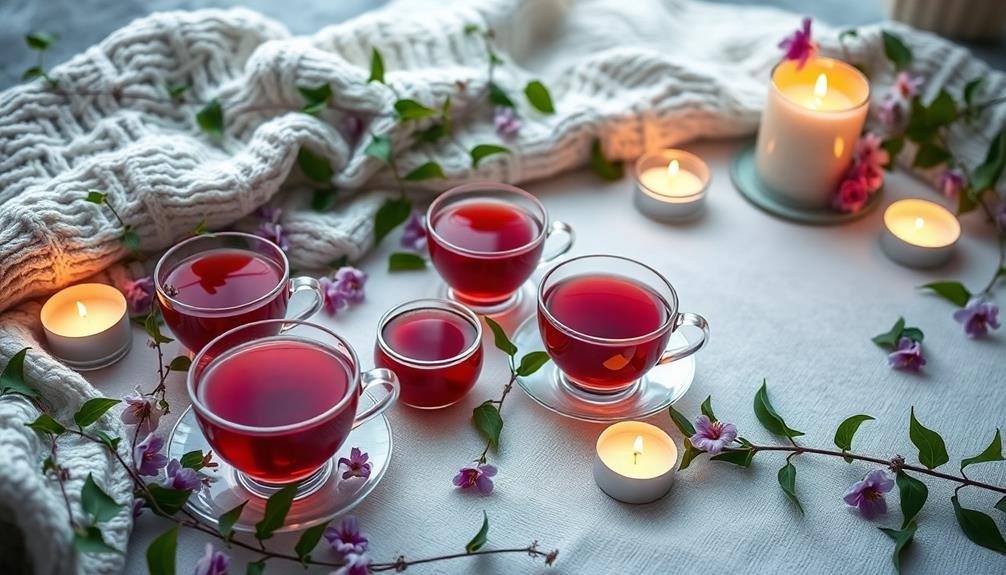
Passionflower tea variations offer a delightful way to enhance your nighttime routine and promote relaxation. You can explore different blends to elevate your experience, making it both enjoyable and effective for your sleep. Each variation brings a unique flavor and an array of calming benefits.
Here are some enticing options to evaluate:
- Passionflower and Chamomile: This classic blend combines the soothing properties of chamomile with the calming effects of passionflower, creating a perfect pre-sleep drink.
- Passionflower and Lavender: Infusing lavender into your passionflower tea adds a fragrant touch that may help reduce anxiety and promote restful sleep.
- Passionflower and Lemon Balm: The combination of these two herbs enhances relaxation while offering a subtle citrus flavor, making it a rejuvenating option for bedtime.
- Passionflower with Honey: Sweeten your tea with a touch of honey for a comforting and delightful flavor that also boosts its soothing properties.
Experimenting with these variations lets you find the perfect blend to help you unwind, making your journey to a peaceful night's sleep even better.
Peppermint and Sleep
Peppermint tea isn't just a revitalizing beverage; it can also play a role in improving your sleep quality. While it's well-known for its invigorating flavor, peppermint has calming properties that can help ease tension and promote relaxation. When you sip on a warm cup of peppermint tea before bed, you might find it easier to unwind after a long day.
The menthol in peppermint can help alleviate headaches and digestive issues, which often disrupt your ability to fall asleep. By soothing these discomforts, you're creating a more peaceful environment for rest.
Plus, the aroma of peppermint can have a calming effect, making your nighttime routine more enjoyable.
Drinking peppermint tea can also support better breathing, especially if you're dealing with sinus congestion. Clearer airways help you breathe easier during the night, ultimately leading to more restful sleep.
Creating Your Custom Blend
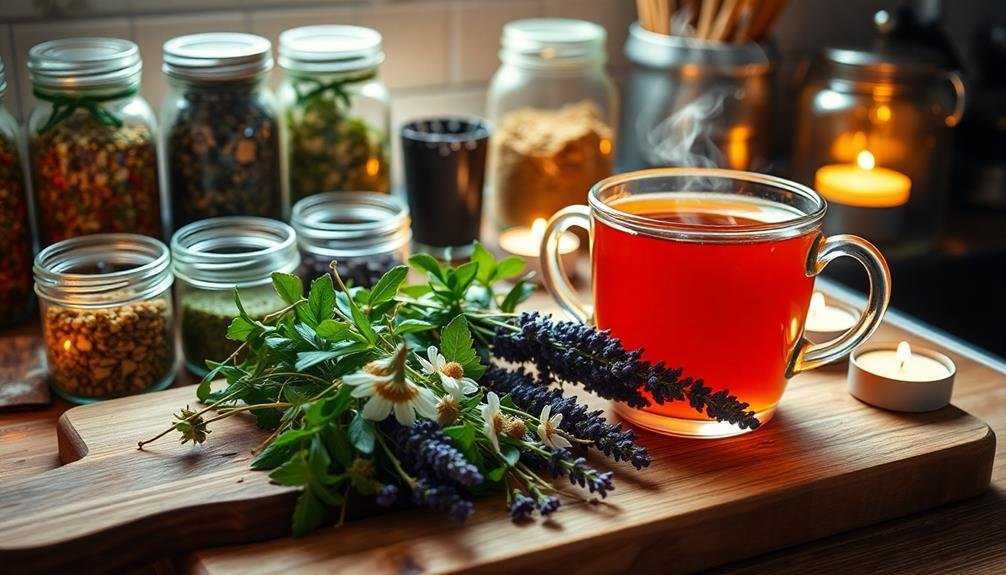
Creating your custom blend of herbal teas can be a delightful way to enhance your sleep routine. By experimenting with different herbs, you can tailor a tea that suits your unique preferences and needs.
Start by selecting a base herb known for its calming properties, like chamomile or lavender. These will help establish a soothing foundation for your blend.
Next, consider adding supporting herbs that complement your base. Here are some options to inspire you:
- Valerian Root: Known for its sedative qualities, it's perfect for promoting deep sleep.
- Lemon Balm: It offers a gentle, pleasant flavor while reducing anxiety and stress.
- Passionflower: This herb can help improve sleep quality and reduce insomnia.
- Hops: Often used in beer, hops can also help relax your mind and body.
Once you've chosen your ingredients, mix them in proportions that appeal to you.
Don't hesitate to adjust the ratios over time until you find the perfect balance. Enjoying your personalized herbal tea blend can create a calming bedtime ritual, paving the way for better sleep and overall well-being.
Frequently Asked Questions
Can Herbal Teas Replace Sleep Medications?
Herbal teas can complement your sleep routine, but they shouldn't fully replace sleep medications without consulting a healthcare professional. You might find them helpful for relaxation, but everyone's needs and responses vary considerably.
Are There Any Side Effects of Herbal Teas?
Yes, herbal teas can have side effects. You might experience allergic reactions, digestive issues, or interactions with medications. It's important to consult a healthcare professional before incorporating them into your routine for safety.
How Long Before Bed Should I Drink Herbal Tea?
You should drink herbal tea about 30 to 60 minutes before bed. This gives your body time to relax and absorb the calming effects, helping you unwind and prepare for a restful night's sleep.
Can I Combine Different Herbal Teas for Better Sleep?
Yes, you can combine different herbal teas for better sleep. Mixing calming ingredients like chamomile, lavender, or valerian root enhances relaxation. Just make sure to listen to your body and find the combination that works best for you.
What Is the Best Herbal Tea for Anxiety Relief?
When you seek anxiety relief, chamomile and lavender teas work wonders. They calm your mind and body, helping you unwind. Try sipping them regularly, and you'll notice a soothing difference in your overall well-being.
In Summary
Incorporating herbal teas into your bedtime routine can profoundly improve your sleep quality. Whether you choose calming chamomile, soothing lavender, or relaxing valerian root, each blend offers unique benefits. Don't forget to experiment with different combinations to find what works best for you. By creating your custom blend, you'll not only enjoy a delicious drink but also set the stage for a restful night. So, sip your way to better sleep and wake up refreshed!

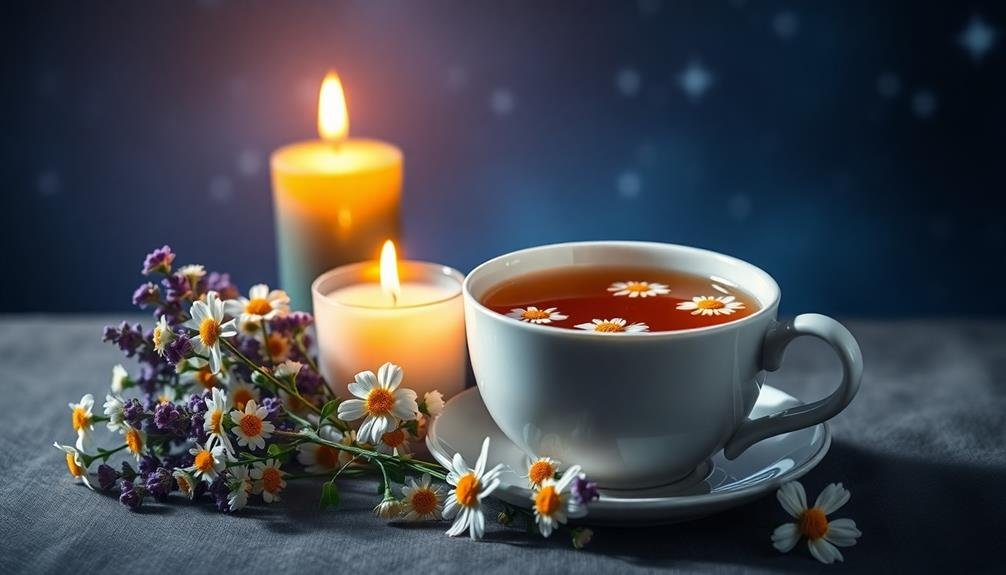

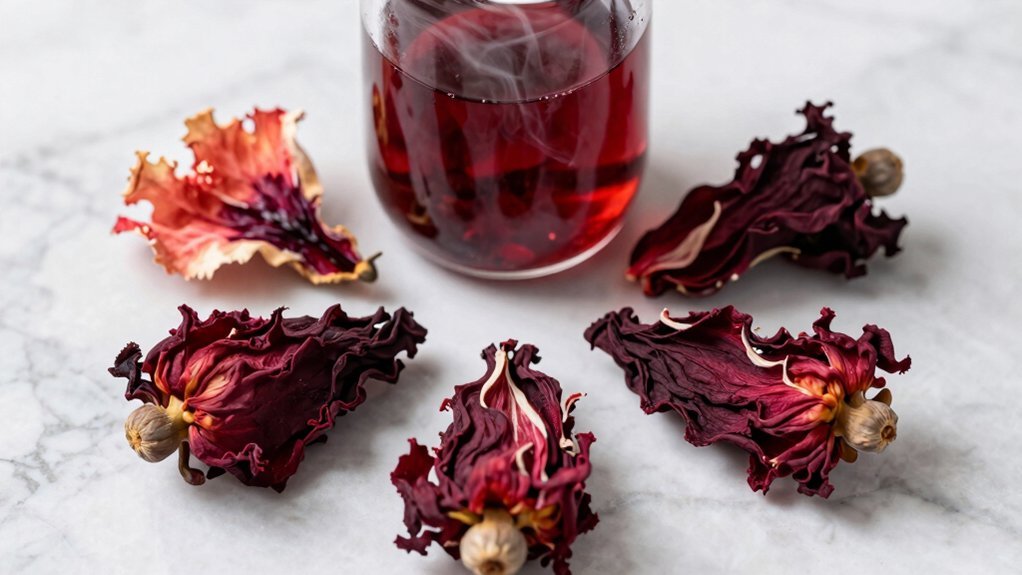

Leave a Reply